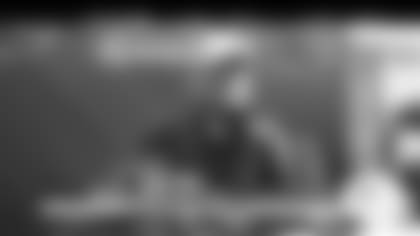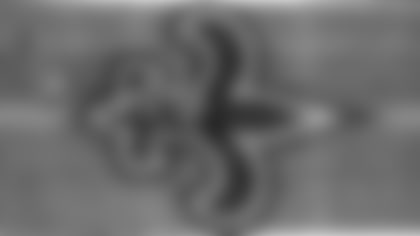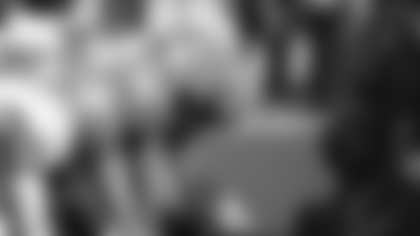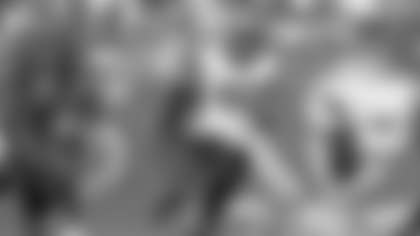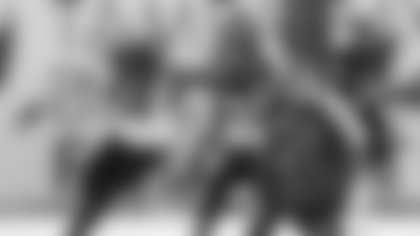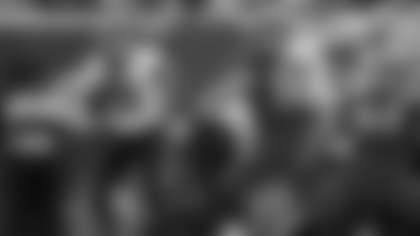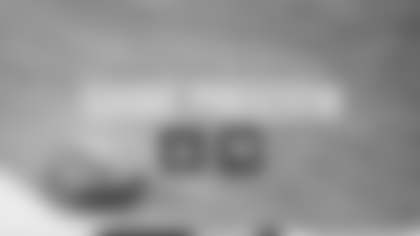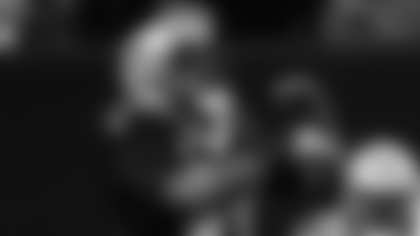<span>QUOTES FROM NEW ORLEANS SAINTS PRESS CONFERENCE
HEAD COACH SEAN PAYTON
(opening statement) "We just finished up the morning meetings, and we practice this afternoon. It's a little bit different schedule-wise, and the transition has gone pretty well logistically."
(on why Joe Lombardi is the Saints' quarterbacks coach) "When Doug Marrone left last year to become the head coach at Syracuse, Pete Carmichael was promoted to the (offensive) coordinator's position. Joe, who had worked as the quality control coach, was promoted. So Pete, on a daily basis, is the coordinator, and Joe and he work with Drew (Brees). I've said this before. I have a good support staff and a good group of coaches. We always try to look from within when it comes to a promotion."
(on coaching Drew Brees) "When it comes to coaching a guy like Drew Brees, there are a lot of unique traits and characteristics that make it a good relationship. He's driven, his expectation levels of himself, he has great work ethic and he's talented – all of those things."
(on how motion is a big part of the Saints' offense) "There are certain plays that are more motion-friendly. Sometimes, it allows the receiver a better release than if he was stationary. In other words, the guy in charge of re-routing him, when he has to move as well, may not be able to get his hands on him as cleanly. Other times, it may be just simply to get leverage on the defense, to get to a landmark maybe a little more effectively than a tight split. Sometimes when you are playing with a lot of crowd noise, you line up in some nasty or tight splits without motion because you are worried about the silent counts. There are a lot of reasons for it. Hopefully when we do something like that, there is a reason we are doing it other than just to do it. The timing of it, the motion landmarks and the snap count – all of those things factor in."
(on his time at San Diego State) "I was playing over in London in 1987, and I knew that I wanted to get into coaching. The route in college is to become a graduate assistant, and that's very common. And yet, it's challenging to find one of those graduate assistantships. Steve Devine was at San Diego State, and he was the offensive line coach and the coach in charge of hiring the GAs. Through several conversations overseas, and eventually a letter, I was hired over the phone. Shortly thereafter, I made my way back to Chicago – Naperville was home – and packed the car up and drove to San Diego. The car broke down somewhere in Colorado, and I arrived there three days later. Steve was someone who was extremely instrumental in getting me started, and I stayed with his family for three or four weeks just trying to get a break. Usually for all of us, no matter what career you're in, there is always someone responsible for helping, and certainly he played a big role in the beginning of my development."
(on Reggie Bush's learning curve) "A player like Reggie, like a lot of young players coming out as juniors, they are younger in their development. Since he's been here in 2006, he is a big part of what we've done. In 2007 and 2008, he had to battle through some injuries, but he's been a big part of our success offensively. Whether it's in the passing game or the running game, clearly players that come to you as juniors and early-outs have that much more growth potential just in regards to the logistics of the game. You see a guy like Robert Meachem who came out early. But each year, Reggie's developed his overall understanding of what we are doing has been increased. He's been in the same system. He gives us a dimension in the running game or in the passing game – it might be misdirection that's unique. It began in 2006, and it's continued to date. He's been a big part of why we've been successful offensively."
(on if he has reached out to other Super Bowl coaches in preparation for this week) "I talked to a few guys, guys who are close to me and some who are not as close to me, and they have been very helpful. As teachers we are always trying to cover as much as we can and gather as much information as you can in your preparation."
(on Garrett Hartley and how much John Carney has helped Hartley) "It's a good compliment having John (Carney) here. As we transition back where Garrett was kicking, he came to us a year ago at midseason. We had three or four kickers in for workouts, and he was clearly a step ahead of that group. We signed him, and he finished last season 13 for 13 as a rookie. He's kicked in big spots at Oklahoma, and he was at a large high school in Southlake, Texas. He's been in big games, state championships and national championships. John's presence and arrival knowing that we didn't have Garrett to start the season, has really helped Garrett's growth. John is one of those even-keel guys who doesn't speak a lot, but when he talks, he's saying something pretty important. That relationship has been a positive. John's done a great job and has a bright career if he wants to coach. The fit's been good, and I think you've seen Garrett get better and pay attention to the little things."
(on his process when he took the Saints' job) "It was after the 2005 season, and it was a little hectic because after the season there were two or three teams that I was going to interview with. I had gone to interview with Green Bay and had gone to New Orleans to interview. The time I spent with Mickey Loomis was important, and the interview was productive and went well. The time I spent in Green Bay with Ted (Thompson) and their organization really helped me with a first or second interview I had taken, and those guys do a great job up there. More than anything else, you really get a feel for people. There were concerns logistically about living there that close after (Hurricane) Katrina – those are concerns you have for your family, other players and coaches that you are bringing in and trying to hire and sign. We had just finished building a house back in Texas, and logistically there were a bunch of things that didn't make it the right time. There was enough in the two visits that I felt we had a chance to make a difference. There is a lot of work that goes into it, like surrounding yourself with the right people, and we've been able to do that, and Mickey has allowed me to do that. That relationship I have with him is critical. I don't take that very lightly. I take it very seriously because I don't think that exists throughout our league."
(on his staff members from Miami University in Ohio) "I had two real good years as coach there as a coach under the late Randy Walker, who went on to Northwestern, and we lost him a couple of years ago, which was a tragedy. Randy impacted a lot of us. When I got hired (by the Saints), I was able to hire Dan Dalrymple, our strength coach from Miami. Shortly thereafter, I was able to hire Aaron Kromer to come in a year ago. He coached running backs, and now he's coaching the offensive line and coordinating the run game. Charlie Byrd is another guy who is working with our strength and conditioning program. Usually when you have experiences at certain schools, you pay attention to coaches that you felt you would like to work with again someday. If you went through my staff, Curtis Johnson – we were together at San Diego State and he went to the University of Miami, where we hired him. Bret Ingalls and I were at San Diego State together. Greg McMahon and I were at Illinois together, Joe Vitt and I were at the (Philadelphia) Eagles together. When you have a background and you know exactly what you are getting, that's pretty valuable. I've got a great group, and they do a great job."
(on his relationship with the Dolphins' Bill Parcells and Tony Sparano) "I have a real good relationship with both Tony and Bill. Tony and I got hired within a week of each other in Dallas, and I spent a lot of evenings in late meetings with him. He is a tremendous coach. He is one of the guys I tried to hire right when I got named the head coach in New Orleans, and Bill is smarter than that. Both Tony and Bill are two guys who I would consider as close friends in this business, and both of them have done a great job here in Miami. Logistically it's provided me an opportunity to have a chance to say hello to them, which was nice. They've done a lot of good things here, and certainly we felt that they were one of the better teams we played during the regular season. You can see the turnaround quickly in the program, and that's not a surprise."
(on the difference in play on the Saints' offensive and defensive lines) "Offensively we started with the development of guys like (Jon) Stinchcomb at right tackle, and Jahri Evans, who we drafted a few years ago in a big draft for us, certainly has given us real good guard play. (Jonathan) Goodwin filled in for (Jeff) Faine when we lost him to free agency. Carl Nicks was a good pick for us in the fifth round. Jermon Bushrod stepped in with the injury to Jammal (Brown). That group has been together now. I like their size and their power, and it's a physical group that really works well together. Aaron (Kromer) has done a good job of developing what we are doing from a run and protection standpoint. It's a really close-knit group that's been together now for a couple of years, and have gotten these reps together, and Jermon's handled the transition well. Defensively to their credit, there have been some new faces in Anthony Hargrove as an offseason addition. Will Smith, Charles (Grant), before he was injured, now Bobby McCray. There have been a few new faces, and you look at Sedrick Ellis, who's been healthy now. We rotate those guys through. Jeff Charleston gets snaps. It's an active front and I think Gregg (Williams), Bill Johnson and those guys do a great job in their preparation. You see the effort to the ball, and I think that is what you will see this Sunday when you look at both defenses. Both of them are extremely quick to the football, they run well, there is a lot of hustle, and that's a good sign of coaching."
(on Drew Brees' leadership and development into one of the league's top quarterbacks) "He has complete command of what we are doing. When you do it successfully, immediately you gain respect from your peer group. When you work like he works, it's hard not to try to keep up. That is one of his great traits. He brings the level of competition up amongst everyone, not just the offense, but defensively. Those are unique skill sets, and there is a lot that goes into that. Knowledge, talent, work ethic, all of those things that fall under leadership, and yet there are so many things that you can't take for granted. Each day, there is an example that's new to me. It's pretty special, and certainly I don't take it for granted. It's a big reason why we are sitting here right now."
(on his first Saints training camp in Jackson, Miss., in 2006) "We went there in our first year. Logistically, we wanted to get a couple of hours away from New Orleans. With everything that was going on, we felt it was good to get to a small college campus. I like those environments for training camp. Maybe I'm more of a traditionalist that way. I like the idea of a dorm key around your neck, and checking in for a few weeks. Obviously it's hot there. We wanted that camp to be tough, we wanted to evaluate everyone fairly, and we wanted it mentally and physically draining. We were fortunate with the weather there; the facilities were outstanding in regards to the space and meeting rooms. People were very accommodating, and the people of Jackson, Mississippi, were great to us. There is a unique bond there now with this team and that city that exists that maybe didn't exist prior to. It was very hospitable for us, and these things grow a little bit of legend – the training camp there. It was tough, and we played our preseason games away, and we played one of the games there in Jackson and one in Shreveport. We wanted it to be physical, we wanted it to set a tempo and a tone for what this program was going to be about. The three years we served there were productive."


